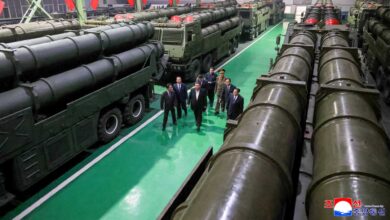On December 16, 2009, Kim Jong Il was looking round the production lines at the Rason Taehung Trading Corporation.
“What is the next?” he asked an official of the corporation.
The latter answered that he would be guided to the pine mushroom liquor shop.
He watched a fermenting tank and then studied the packaging process for a good while. The machines for washing, bottling and capping were rumbling and he said that he was happy to see the automated process though CNC technology had yet to be introduced.
He asked the official, “How many bottles are there in store now?”
The official replied 2 000 bottles.
The General inquired in detail about the amount of raw materials, the estimated volume of production, the daily output and the capacity of the fermenting tank.
Then he said, “I will buy all the products here.”
He held up a bottle and asked, “How strong is it?”
“It is 30%,” answered the official.
The General asked an official in his company to have a taste of it. The latter sipped the liquor and said that it had a characteristic odour of the mushroom.
Kim Jong Il instructed the official of the corporation to transport to Pyongyang all that it had produced during the 150- and 100-day campaigns.
The official said that he would comply, but with a puzzled look.
At that time a provincial official suggested to the General that some bottles be given to the officials in his company.
But he shook his head in disagreement and said it would be better to supply the products to the citizens of Pyongyang. He reiterated that they should be transported to the city with the same trademark on the bottles.
This year is full of auspicious events and commodities have been produced in large quantities during the 150- and 100-day campaigns, he added. He stressed that they should be supplied to the citizens through department stores in Pyongyang, which would be in a festive mood.

